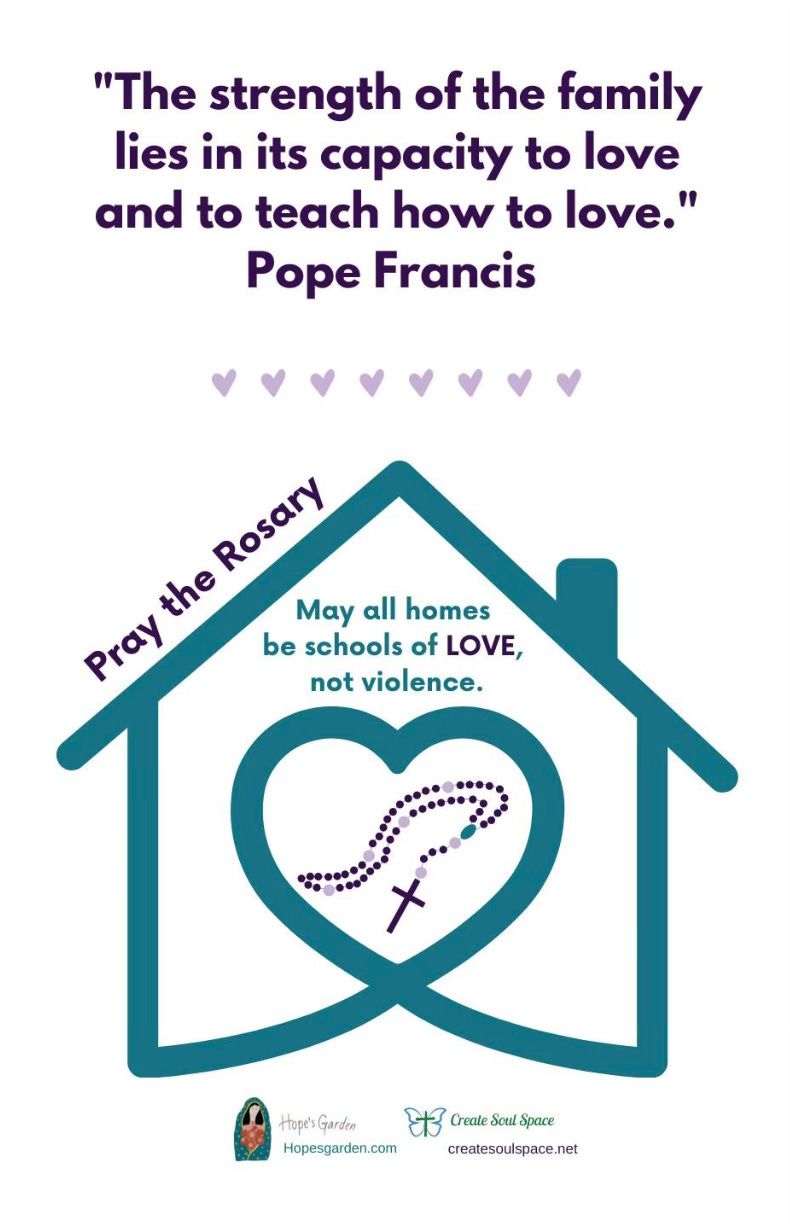Musings from Fr. Phil: Rosary Campaign for October
October is the month of the Holy Rosary, Respect Life Month, and Domestic Violence Awareness month. Fr. Phil Tracy invites everyone to join our Rosary Campaign for an end to domestic violence.
Note from Jenny:
I’m pleased to offer this reflection from my dear friend, Fr. Phil Tracy of All Saints’ Parish in the Diocese of Portland, ME.
Navigating friendships in the seventies was challenging. Neighborhoods played an important role in the pecking order at school. The Tracy Five were fortunate not to live in the Ferry Village section of South Portland, Maine, but we were on the line. We knew that there were good kids living there, but the prevailing social pressure at school was to mock them.
Another tribal marker were clothes. Converse sneakers and rugby shirts were cool, until they were replaced by Nike and Izod shirts. The Tracy Five were never fashion plates, and hand me downs were the norm for large families like ours. Each of us felt the pain at some point of wearing the wrong style of clothing in front of the wrong set of kids.
Other factors that determined the boundaries of potential friendships included whether you did well at sports or were academically inclined, if your older siblings were popular or successful in something, the occupation of one’s parents, the quality of one’s toys, and the degree that a kindness could be reciprocated back to someone. So, if a boy lived in a fashionable neighborhood, dressed in the latest fashions, had an older brother who was the star quarterback and or could drive a car, and had parents who let kids play in their pool or would take friends on cool trips, that person was the alpha child to whom everyone wanted to be a best friend. Sadly, they realized this.
Kids played together back in the day. We did not make play dates. We did not spend hours on video games or talking on the phone. We met on a playground or rode our bike around until we saw someone to do something with that day. Familiarity can breed contempt, so perhaps we focused on all these markers to explain away those times that we lost our “best friend.” We might not have been a good friend, but our egos would not except that we had done something wrong. We were the same; they had changed.
I offer this reflection because October is not only dedicated to the Holy Rosary, but it’s also Domestic Violence Awareness month. My parish is joining the annual Rosary campaign from Hope’s Garden and Create Soul Space, to help raise awareness of abusive situations in families and relationships. I encourage all individuals and parishes to join—for more details on the campaign, including printable images for your bulletins and social media, click here.
When we hear the word abuse, the first things we tend to think about are corporeal punishment or physical violence. However, there are many levels of abuse that go on. One of the warning signs that to look out for is a narcissistic personality. This is a person who usually feels that they are entitled to favorable treatment, manipulate situations to please themselves at the expense of others, constantly demand admiration and respect and finally, lack empathy for the needs and concerns of others.
As kids, we tended to make excuses for such people, and perhaps even admire them. We might see entitlement as confidence. They knew what they wanted and were not afraid to go after it. We were so honored that they wanted to be with us that we did not notice that they had manipulated us to leave other friends or go against our parish rules. When they bragged or trumped our stories of success or a new possession, we envied their superior opportunity. Finally, when they made fun of where people lived, how they dressed, or how they hurt themselves falling off a bike, we felt it was better that they were talking about someone else, not us. We convinced ourselves that it was funny to see the face of the person flying through the air and not focus on their hurt leg or damaged bike.
This was not healthy as children, and it is dangerous as adults.
If we exhibit these behaviors as parents to our children, we diminish their capacity to learn about healthy relationships. If we exhibit these behaviors to a spouse, we abuse them in a way that compromises the sacramental nature of a marriage.
Obviously, this is a topic that demands more information than my few paragraphs. If you need information, you can contact Jenny duBay and she’ll send you a list of resources. Yet there’s something else you can do, something powerful and healing:
Please join Hope’s Garden and Create Soul Space this month in offering a daily Rosary for the healing of hearts and homes. Together, we can invite God to enter more fully into our lives and pray for those who are seeking healing, forgiveness, and hope.






Thank you, For Phil, for this message! Thank you for promoting awareness of Domestic Violence!! I am most proud of you.!
Kathleen (Kathy) Daley